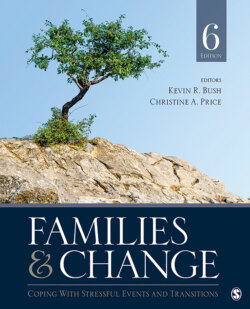Читать книгу Families & Change - Группа авторов - Страница 82
На сайте Литреса книга снята с продажи.
Conclusion
ОглавлениеThis chapter has demonstrated that scholarship on parental stress can be conceptualized with constructs from family stress theory in ways that add to our understanding of individual and relationship levels of family systems. When faced with demanding situations, parental stress or crisis are complex products of several factors: (a) the nature of the stressor or crisis event; (b) the potential recovery factors in the form of resources, coping styles, and adaptive abilities available to parents; and (c) the subjective definitions or appraisals that parents assign to the stressor events. These seemingly separate ideas are only truly meaningful when they are virtually indistinguishable and function together in real time.
Applying family stress concepts to parental stress helps us to gain greater understanding about the possible range of circumstances that can exist from highly disruptive (nonnormative) crises to chronic stress and more normative challenges. A major contribution of family stress theory is the insight it provides about how parental stress applies to both the individual and relationship or systemic levels of family life. Applying family stress theory concepts to the scholarship on parental stress helps to show more clearly (a) that parental stress is normal, (b) why the intensity of parental stress varies widely across individual parents and parent–child relationships, (c) why parents and families cope with and adapt to stress differently, and (d) how individual parenting stress and systemic stress influence the socialization performance of parents’ and the psychosocial well-being of the young. Parental stress can function to disrupt, inhibit, or energize mothers and fathers, depending on numerous individual and socioenvironmental factors. As my mother used to tell me, “the really meaningful things in life are often complicated and don’t come easily!”
